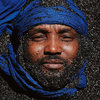Club Tounsi by AMMAR 808

Since the release of AMMAR 808's debut »Maghreb United«(2018) – a rumbling pan-North African electronic classic – the Tunisian producer has been in the vanguard of artists navigating the intersection of traditional and contemporary sonics.
His deep-rooted, room-shaking 3rd album »Club Tounsi« isn’t just a powerful statement of his Tunisian identity. It’s also a joyous celebration of the dancefloor, blending Mezoued rhythms and instrumentation with an impossibly infectious blast of bass-heavy futurism.
MEZOUED REBORN . DANCE-FLOOR MADE IN TUNISIA . DARBOUKA RELOADED . EVERYTHING HAPPENS AFTER MIDNIGHT . BASS REVOLUTION .
-----------------------------------------------------------------------------------------------
Denmark-based Tunisian producer Sofyann Ben Youssef has already created whole new worlds of sound. His startling debut as AMMAR 808 – 2018’s Maghreb United – fused thumping TR-808 drum machine rhythms and bone-rattling bass with traditional North African folk instrumentalists and vocalists from Tunisia, Algeria and Morocco, suggesting a pan-Maghreb science-fiction mash-up worthy of William Burroughs’ most fevered dreams.
For his follow-up – 2020’s Global Control / Invisible Invasion – he turned his attention to South Indian, collaborating with esteemed musicians and vocalists and imbuing the Carnatic and other south indian musical traditions with 21st century energy as he investigated the ancient tales of the Mahabharata.
Now, for his latest album – Club Tounsi – he sets his sights on home, with an album that investigates and explores the vibrant folk tradition of his native Tunisia. “It’s a particular genre of folk,” AMMAR 808 explains. “It’s called Mezoued.” Named after the ancient mezoued goatskin bagpipes that provide the music’s sinuous melodies, it’s traditionally accompanying popular singers also backed by clattering hand drums.
Originating in the 1950s, when a surge of rural migrants flocked to the capital Tunis in search of work, it’s the music of the downtrodden and the underdog, long frowned upon by polite Tunisian society. “It originated with the immigrants and the working class,” says AMMAR 808. “These people were coming from all around Tunisia due to their economical situation. They were considered people from the ghettoes, and they were discriminated against. This music was even banished from Tunisian TV for a long time.”
Yet, as AMMAR 808 explains, the music persisted. “It evolved out of that stigmatisation and became something that actually speaks to all Tunisians, because it takes its roots from all available music in Tunisia.” In Mezoued, you’ll find Sufi devotional hymns, malouf melodies, Arabic scales and ancient folksong all part of one repertoire. Although it´s lyrics are preoccupied with hardship and the pain of love, Mezoued music wants to party hard. And rhythm is the key.
“On the album,” says AMMAR 808, “there is a rhythm that keeps coming back. It's called fezzani and it's without contest the Tunisian rhythm par excellence. It exists only in Tunisia. As soon as we start the fezzani medley in wedding parties everybody's hands are in the air. It comes down to the dance floor. It’s for the last part of the night when everybody's super-hot and getting all sweaty!”
On Club Tounsi, AMMAR 808 takes this “festive” tradition and reimagines it for the 21st century with pulsating basslines, shimmering synths, crunching distortion and mechanistic drum machine rhythms.
“I want to grab energies from the past, from the root of the music and then project them to the future,” he says. “It’s like a bridging between places and times.”
To bring this vision to life, AMMAR 808 returned to Tunisia in summer 2023, to record contributions from some of the country’s top musicians playing hand drums, bagpipes and also the buzzing ney reed instrument. These are melded with his electronic textures, creating a sound both progressive and nostalgic, beaming out of an ever-renewing eternal now.
“On a lot of these songs, I was looking into the repetitiveness of the drum looping and the percussion. Sometimes I loop the percussion just to have the feeling of electronic music that is always repetitive – and, on top, I put solo percussion that is completely free, to create really extreme contrast. I love that contrast between this machine-like feeling, but it still grooves with real percussion played by a real percussionist.”
AMMAR 808 also enlisted the voices of three amazing Tunisian vocalists from disparate disciplines. Mariem Bettouhami is a lyrical singer who, like AMMAR 808, has studied at the Institute of Music in Tunis. Mahmoud Lahbib is a veteran of the pure Mezoued tradition. And Brahim Riahi, another alumnus of the Institute of Music, has a background in Sufi singing.
“It was a magical process,” says AMMAR 808. “I heard this music all the time when I was growing up. It’s like coming home.”
When it came to choosing the repertoire for the recording sessions, AMMAR 808 was determined to echo that sense of continuity by focussing on some of the very best known Mezoued tunes. “I didn’t want to be original in the choice of tracks, but rather in the emotional proposition” he explains. “ It was about choosing the tracks that have the most impact and represent perfectly this tradition. There's a reason why they stood the test of time.”
But, at the same time, he’s devoted to taking these favourites and completely rewiring them for the future.
Listen to “Aman Aman,” for instance. It’s an ancient folk song, filled with lovelorn longing, traditionally played to an insistent beat. In AMMAR 808’s hands, it’s transformed into an eerie lament, with an extended introduction of spooky synth arpeggios and Mariem Bettouhami’s auto-tuned vocals. “The lyrics are pretty sad,” says AMMAR 808, “but I wanted to enhance that sadness in an extreme way. So, I made this cinematographic and very slow movement. That song has never been interpreted in that way before.”
“It's rediscovering a very popular track in a completely new context – and for a new generation. I have talked to many young Tunisian people, and many of them don't know these tracks. So, it's about making the bridge to this young generation who go clubbing, and for them to be able to hear something made in Tunisia, by Tunisia, for Tunisia and the world.”
That’s Club Tounsi. A space where the past meets the future. Where the dancefloor is hot and the rhythms are heavy. Come on in. It’s about to get serious.
Tracklist
| 1. | Douri Douri | 4:10 |
| 2. | Ah Yallila | |
| 3. | Brobba | |
| 4. | Lelliri Yamma | |
| 5. | Aman Aman | |
| 6. | Rakeb Aalhamra | |
| 7. | Eddayem Allah | |
| 8. | Tichtiri Cherbak | |






